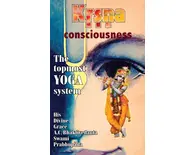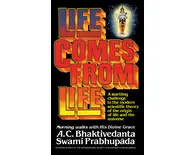Customers who bought this also bought
About this item
The happiness that we are experiencing in the material world is not real happiness. If one asks a tree, "Are you feeling happy?" the tree, if it could, might say, "Yes, I am happy, standing here all year. I'm enjoying the wind and snowfall very much, etc." This may be enjoyed by the tree, but for the human being it is a very low standard of enjoyment. There are different kinds and grades of living entities, and their conceptions and perceptions of happiness are also of all different types and grades. Although one animal may see that another animal is being slaughtered, he will go right on chewing grass, for he has no knowledge to understand that he may be next. He is thinking that he is happy, but at the next moment he may be slaughtered.
In this way there are different degrees of happiness. Yet of all of them, what is the highest happiness? Sri Krishna tells Arjuna: "In that joyous state (samadhi), one is situated in boundless transcendental happiness and enjoys himself through transcendental senses. Established thus, one never departs from the truth." (Bg. 6.21)
One has to be intelligent if he wants to enjoy. Animals do not have really developed intelligence and so cannot enjoy life as a human being can. The hands, the nose, the eyes, the other sense organs and all the bodily parts may be present on a dead man, but he cannot enjoy. Why not? The enjoying energy, the spiritual spark, has left, and therefore the body has no power. If one looks further into the matter with a little intelligence, he can understand that it was not the body that was enjoying at all but the small spiritual spark that was within. Although one may think that he is enjoying by the bodily sense organs, the real enjoyer is that spiritual spark. That spark always has the potency of enjoyment, but it is not always manifest due to being covered by the material tabernacle. Although we may not be aware of it, it is not possible for the body to experience enjoyment without the presence of this spiritual spark. If a man is offered the dead body of a beautiful woman, will he accept it? No, because the spiritual spark has moved out of the body. Not only was it enjoying within the body, but it was maintaining the body. When that spark leaves, the body simply deteriorates.
It follows that if the spirit is enjoying, it must have its senses also, otherwise how can it enjoy? The Vedas confirm that the spirit soul, although atomic in size, is the actual enjoying agent. It is not possible to measure the soul, but that is not to say that it is without measurement. An object may seem to us to be no bigger than a point and may seem to have no length or width, but when we perceive it under a microscope we can see that it has both length and width. Similarly, the soul also has its dimensions, but we cannot perceive them. When we buy a suit or dress, it is made to fit the body. The spiritual spark must have form, otherwise how is it the material body has grown to accommodate it? The conclusion is that the spiritual spark is not impersonal. It is an actual person. God is an actual person, and the spiritual spark, being a fragmental part of Him, is also a person. If the father has personality and individuality, the son also has them; and if the son has them, we can conclude that the father has them. So how can we, as sons of God, assert our personality and individuality and at the same time deny them to our Father, the Supreme Lord?
We have to transcend these material senses before we can appreciate real happiness. The yogis who are aspiring after spiritual life are also tasting enjoyment by focusing on the Supersoul within. If there is no pleasure, if there is no enjoyment, then what is the point of going to so much trouble to control the senses? What kind of pleasure are the yogis relishing if they are taking so much trouble? That pleasure is ananta?endless. How is this? The spirit soul is eternal, and the Supreme Lord is eternal; therefore reciprocation of their loving exchanges is eternal. One who is actually intelligent will refrain from the flickering sensual enjoyment of this material body and fix his enjoyment in spiritual life. His participation in spiritual life with the Supreme Lord is called rasa-lila.
A foolish man, who cannot understand what real happiness is, seeks happiness in this material world. In India there is the story of a man who did not know what sugarcane was and was told that it was very sweet to chew. "Oh, what does it look like?" he asked. "It looks just like a bamboo rod," someone said. So the foolish man began to chew all kinds of bamboo rods. How can he begin to experience the sweetness of sugarcane? Similarly, we are trying to get happiness and pleasure, but we are trying for them by chewing this material body; therefore there is no happiness and no pleasure. For the time being there may be some little feeling of pleasure, but that is not actual pleasure, for it is temporary. It is like a show of lightning which we may see flashing in the sky that may momentarily seem like lightning, but the real lightning is beyond that. Because a person does not really know what happiness is, he deviates from real happiness.
The material world is compared to a great ocean. Within this material universe there are millions and billions of planets floating in space, and we can just imagine how many Atlantic and pacific Oceans are there. In fact, the whole material universe is likened to a great ocean of misery, an ocean of birth and death. In order to cross this great ocean of nescience, a strong boat is needed, and that strong boat is the lotus feet of Krishna. We should immediately get aboard that boat. We should not hesitate, thinking that Krishna's feet are very small. The whole universe is simply resting on His leg. For one who takes shelter of His feet, it is said that the material universe is no more significant than a puddle of water found in the impression of a calf's hoofprint. There is certainly no difficulty in crossing over such a small puddle.
We are entangled in this material world due to uncontrolled senses. The yoga process is meant to control these senses. If somehow we can manage to control the senses, we can turn our face to actual spiritual happiness and make our lives successful.
"One should engage oneself in the practice of yoga with undeviating determination and faith. One should abandon, without exception, all material desires born of false ego and thus control all the senses on all sides by the mind. Gradually, step by step, with full conviction, one should become situated in trance by means of intelligence, and thus the mind should be fixed on the Self alone and should think of nothing else. From whatever and wherever the mind wanders due to its flickering and unsteady nature, one must certainly withdraw it and bring it back under the control of the Self." (Bg. 6.24-26)
The mind is always disturbed. It is going sometimes this way and sometimes that way. By yoga practice we literally drag the mind to Krishna consciousness. The mind strays from Krishna consciousness to so many exterior objects because from time immemorial, life after life, that has been our practice. Due to this, there may be great difficulty in the beginning when one tries to fix his mind in Krishna consciousness, but these difficulties can all be overcome. It is because the mind is agitated and not fixed on Krishna that it goes from one thought to another. For instance, when we are engaged in work, memories of events that happened ten, twenty, thirty or forty years ago may suddenly come to our mind for no apparent reason. These thoughts come from our subconscious, and because they are always rising, the mind is always agitated. If we agitate a lake or a pond, all the mud from the bottom comes to the surface. Similarly, when the mind is agitated so many thoughts arise from the subconscious that have been stored there over the years. If we do not disturb a pond, the mud will settle to the bottom. This yoga process is the means to quiet the mind and allow all these thoughts to settle. For this reason there are so many rules and regulations to follow in order to keep the mind from becoming agitated. If we follow the rules and regulations, gradually the mind will come under control. There are so many don'ts and so many do's, and if one is serious about training the mind, he has to follow them. If he acts whimsically, what is the possibility of the mind being controlled? When the mind is finally trained to the point where it will think of nothing but Krishna, it will attain peace and will become very tranquil.
Have a question?
Customer Reviews
What a gem! Srila Prabhupada teaches me in this small book to understand the panoramic view of reality, as well as the daily details of Krishna consciousness. Very encouraging!What a gem! Srila Prabhupada teaches me in this small book to understand the panoramic view of reality, as well as the daily details of Krishna consciousness. Very encouraging!Read less
This is a book in which the author gives an overarching understanding of the spiritual way of life, what motivates us toward it and how we can fulfill that motivation and achieve our spiritual goals.This is a book in which the author gives an overarching understanding of the spiritual way of life, what motivates us toward it and how we can fulfill that motivation and achieve our spiritual goals.Read less

![Teachings of Lord Caitanya [1968 First Edition] Teachings of Lord Caitanya [1968 First Edition]](https://krishnastore.com/images/cache/tlc-195x155.webp)


![Teachings of Queen Kunti [From 1978 Edition, Hardcover] Teachings of Queen Kunti [From 1978 Edition, Hardcover]](https://krishnastore.com/images/cache/TeachingsofqueenKunti-195x155.webp)




![Beyond Birth and Death [1972 (first) edition] Beyond Birth and Death [1972 (first) edition]](https://krishnastore.com/images/cache/bbd-195x155.webp)
![Perfection of Yoga [1972 (first) edition] Perfection of Yoga [1972 (first) edition]](https://krishnastore.com/images/cache/PerfectionxofxYoga-195x155.webp)
![The Nectar of Devotion [1972 Edition] The Nectar of Devotion [1972 Edition]](https://krishnastore.com/images/cache/Nectar-of-Devotion-2018-cover-195x155.webp)

